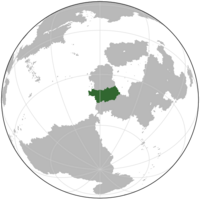Etesia
Republic of Etesia | |
|---|---|
| Anthem: Guð úthellti náð sinni yfir Etesia | |
 | |
| Capital and largest city | Grænnflói |
| Official languages | |
| Ethnic groups (2020) | |
| Religion (2020) |
|
| Demonym(s) | Etesian |
| Government | Unitary presidential republic under an authoritarian dictatorship |
| Artúr Svendsson | |
| Brimþór Böðvarsson | |
| Independence from Inglaterra | |
• Beginning of Colonization | 19 August 1818 |
• Self-Governance | 1 January 1853 |
• Inglaterran UDI | 19 June 1899 |
• Komrep Coup | 1 July 1936 |
• Summer of Fire | June-September 1983 |
• Declaration of the Etesian Republic | 12 November 1983 |
| Area | |
• Total | 1,338,697 km2 (516,874 sq mi) |
• Water (%) | 6.1 |
| Population | |
• 2021 estimate | 49,961,000 |
• Density | 37.3/km2 (96.6/sq mi) |
| GDP (nominal) | 2022 estimate |
• Total | |
• Per capita | |
| Gini (2022) | high |
| HDI (2022) | high |
| Currency | Etesian Gullstykki (₲) (EGS) |
| Date format | dd/mm/yyyy |
| Driving side | right |
| Calling code | +101 |
| ISO 3166 code | IT |
| Internet TLD | .ET |
Etesia, officially the Republic of Etesia is a country in Western Galia. It is bordered by Akenye to the north and Inglaterra to the south, along with sharing maritime borders with Greater Niagara. Covering an area of 1,338,697 square kilometres (516,874 sq mi) and with a population of 49.9 million, Etesia is one of the largest countries in the region, but is sparsely populated. It is dominated by warm weather climates and is divided into seven regions for governance. Grænnflói is the capital and largest city; it is administered separately as a city with special status.
What is now Etesia was primarily colonized by Icelandic-speaking colonists from Niagara. The native population, called the Brúnir, was primarily killed by Niagaran colonists throughout the 19th century until their population dropped to 10% of pre-colonization levels. In the aftermath of the Inglaterran Declaration of Independence, Etesia joined its neighboring colonies and became a special autonomous zone in Inglaterra, often voting similarily to the eastern and Inglaterran-speaking population of Inglaterra. The borders of modern Etesia were formed after the Great War, losing about 9% of modern Etesian territory to Akenye. After the Second Great War, Etesia's autonomous status was slowly eroded by the communist regime. Lingual policies slowly eroded the Etesian language to such a degree that less than one fourth of the country speaks Etesian in day to day life. Increased Etesian nationalism in the 1960s and 70s led to civic unrest, and under the leadership of Valdaamar Guðrúnarkviða, the Etesian autonomous zone asserted increasing rights for itself in the lead up to the Third Great War.
After the Summer of Fire and Inglaterra's political reorganization, Guðrúnarkviða declared Etesian secession from Inglaterra on 12 November 1983. Following the adoption of a new constitution in 1983, free elections were held every three years until 2001 Etesian Elections, where president Artúr Svendsson used intimidation tactics as part of a reelection campaign. Svendsson has served as president ever since and has increasingly centralized and autocratized the Etesian government. Etesia ranks low in international measurements of freedom of the press and civil liberties. It has continued a number of communist-era policies, such as state ownership of large sections of the economy. Etesia is commonly uses capital punishment. In 2000, Etesia and Inglaterra signed a treaty for greater cooperation, forming the Galian Union State.
Etesia is a developing country, ranking 0.788 on the Human Development Index. The country has been a member of the Global Community since its founding and has joined the Mutual Defense Pact. It shows no interest in joining the Trans Galian Partnership.

